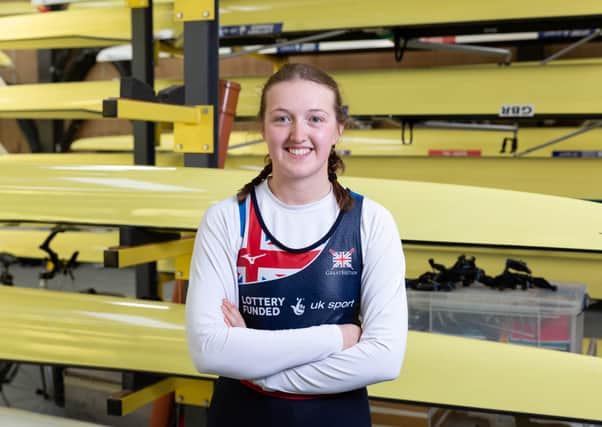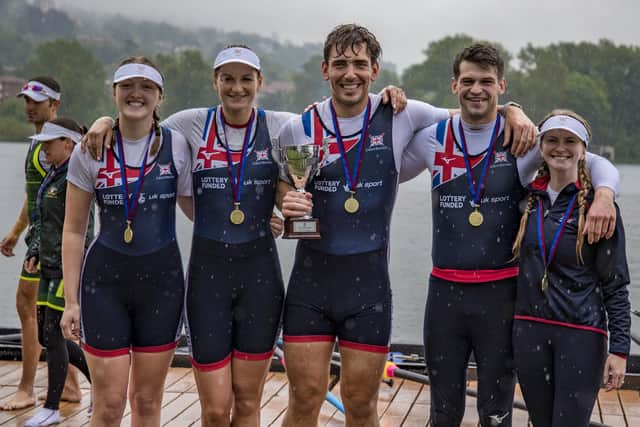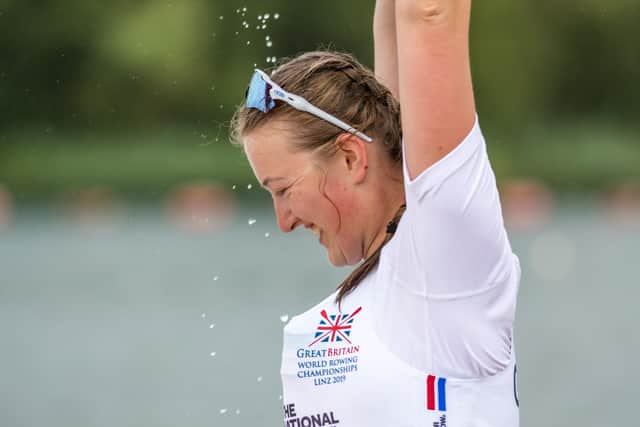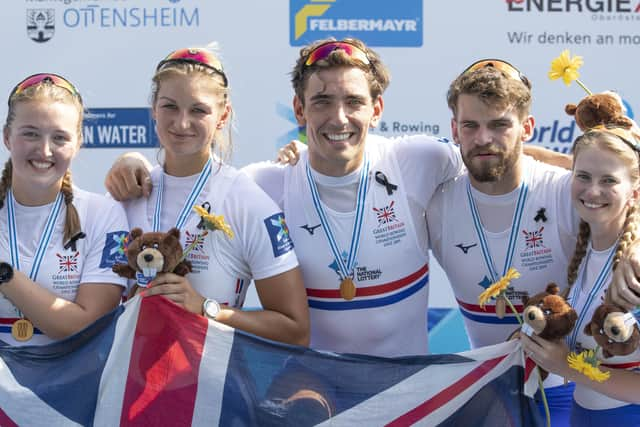Leeds paralympian Ellen Buttrick is rowing for gold in Tokyo


When Ellen Buttrick was told she was losing her sight the first thing she asked the doctors was ‘Does that mean I can row in the Paralympics?’
It wasn’t the response the doctors were expecting, but Ellen is an optimist and was determined to look on the bright side despite being only being 19.
Advertisement
Hide AdAdvertisement
Hide AdEllen, now 24, from Roundhay, Leeds, suffers from a rare form of juvenile macular dystrophy which means her eyesight will get worse as she gets older.


“I can’t see directly in front of me but I can to the sides so I can see the blades going into the water.”
Ellen, a two-time world champion, is now in training for the delayed Tokyo Paralympics .
She fell in love with rowing when she started a learn-to-row course during the opening week of the London 2012 Olympics.
Advertisement
Hide AdAdvertisement
Hide Ad“I used to watch the rowers on the lake at Roundhay Park near where I lived and thought it looked interesting and something I’d like to do one day,” recalls Ellen.


“I remember watching Helen Glover and Heather Stanning win the gold medal. Helen had only been rowing for four years.”
Ellen showed a natural aptitude for rowing and set her sights on completing in the Olympics herself one day.
Then, in 2014 while she was university in Newcastle she started to have problems with her vision.
Advertisement
Hide AdAdvertisement
Hide Ad“I went to five different opticians and I just thought they couldn’t get my prescription right. I never thought it was something wrong with my eyes.”


But in the end she was diagnosed with Stargardt disease, a form of macular degeneration, meaning her central vision is deteriorating, so she cannot drive.
“It’s a genetic disease but we didn’t know anyone in our family who carried it,” she says.
After attending a para-rowing Talent ID day in August 2017, she became a World Champion in the PR3 mixed coxed four just 12 months later in 2018.
Advertisement
Hide AdAdvertisement
Hide AdContinuing her success story, she went on to win two gold medals in 2019 at the Gavirate International Regatta. Now, she hopes to make her Paralympic debut in Tokyo – setting her sights on a gold medal.
She has relocated to Henley to be close to British Rowing’s base at Caversham and when lockdown struck she leapt to the aid of local elderly and vulnerable, becoming the area co-ordinator of the Henley Mutual Aid Group, and made sure no one shielding went without shopping, prescriptions or support.
“I’d worked for the Refugee Council in Leeds and really loved the work – it is something I would love to return to after my career in rowing finishes or at least something in the charity sector.
“When lockdown happened in March who could no longer train on the water and so I decided to do some volunteering. I used to volunteer for my local Brownies and Girl Guides and volunteering is something I really love.
Advertisement
Hide AdAdvertisement
Hide Ad“At the start of the shielding process, a lot of people felt they were fine but as it started to get worse, they relied on the group more and more.
“It’s been really good, we created little communities within each street so if anyone needs anything they can just pop it in the WhatsApp group.
“I grew up in a part of Leeds that used to have a good sense of community, so it’s nice to play a part in that.”
She kept fit using a rowing machine at her home and Zoom sessions with her teammates although she missed home, four and half hours away in Leeds.
Advertisement
Hide AdAdvertisement
Hide AdAfter seven months off the water they were allowed back in. “It felt like being home again,” she says.
Ellen is one of 1,100 athletes on UK Sport’s World Class Programme, funded by the National Lottery.
She competes in the PR3 mixed coxed four who are hot favourites for gold in Tokyo.
“Qualifying for Tokyo was amazing. Everyone has been so supportive of me, family, friends and my local rowing club, it felt like paying them back.”
But then Covid happened and the 2021 games were postponed.
Advertisement
Hide AdAdvertisement
Hide Ad“In the end it was actually a relief when the Games were postponed as there had been so much uncertainty,” says Ellen. “As para athletes, we’re pretty resilient because of what we’ve been through already; we’re used to things changing our life plans. I never expected to get a visual impairment, but it happened and now I’ve made the best of it.”
Now she is back in training for the rescheduled Games next year.
She trains six days a week both on the water and in the gym.
“Myself and my teammates are really motivated to go to Tokyo and get our 10th gold medal. When we get there, it’ll be a special moment to celebrate coming out of this crisis,” says Ellen. “I’ve been really lucky to have the support of the National Lottery, it’s been a massive help to have their continued funding through the pandemic, so thanks to everyone that plays the lottery.”
Advertisement
Hide AdAdvertisement
Hide AdBritain’s para-rowing squad are a tight-knit unit and opened up some of their home workouts so young people could see what the World Class Programme entails. Ellen also led a group session with pioneering charity London Youth Rowing with 76 inner-city children taking part.
“It’s good to do something to keep kids engaged in sport – in normal times we go out on school visits and talk about what we do. It was great to see children asking questions and interested in how we train as elite athletes. My number one source of support during lockdown has been my team-mates on the programme, so if ever I was feeling low I’d just ring one of them up for a chat.”
Comment Guidelines
National World encourages reader discussion on our stories. User feedback, insights and back-and-forth exchanges add a rich layer of context to reporting. Please review our Community Guidelines before commenting.